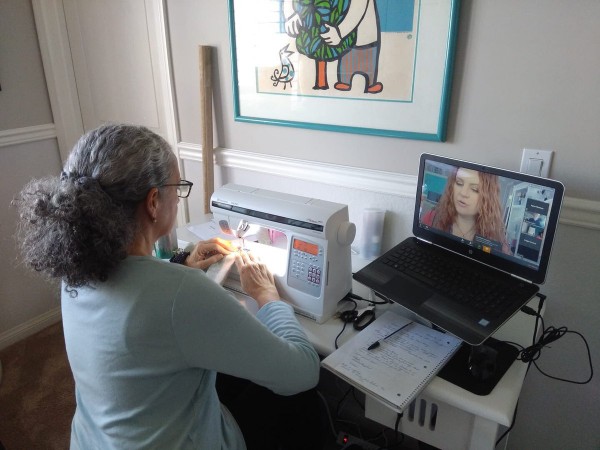
Miramar College mathematics professor Becky Stephens would be the first to tell you she is not the most tech savvy person around. But when the San Diego Community College District (SDCCD) transitioned to online and distance-learning in the wake of the COVID-19 pandemic, she was among the many hundreds of instructors throughout the SDCCD picking up the finer points of teaching from her home computer in a matter of days.
“A lot of this I didn’t know how to do, but we were able to learn pretty quickly,” said Stephens, who has been teaching calculus and other college math courses for nearly 30 years, including more than a decade at Miramar College, and there has been such a community about this. It’s really been amazing.”
Stephens’ experience is common throughout the SDCCD, one of the state’s largest community college districts, where 60,000 students at three colleges and seven San Diego Continuing Education campuses moved to online and distance learning classes beginning March 23. Approximately 19% of SDCCD courses were already offered remotely before the pandemic hit, and the SDCCD’s Online Learning Pathways Department assisted in the recent transformation by creating a walkthrough guide with a research-based approach to quickly converting courses into a remote format. Faculty mentors mobilized at City, Mesa, and Miramar colleges and San Diego Continuing Education, and the SDCCD’s Online Faculty Certificate program saw a threefold increase in enrollments over one week.
Low-income students and others from traditionally underrepresented communities are being provided with critical services, laptops, and Wi-Fi access. Counseling, tutoring, health services, and more also are being provided remotely. Student newspaper staffs are meeting via Zoom. And the SDCCD’s Board of Trustees, which will have a remote session for the first time in its history on April 9, will adopt a resolution lauding “the many outstanding contributions of its faculty, classified professionals, and administrators in response to the coronavirus/COVID-19 crisis.”
Among these contributions, the City College Transfer Center created an online step-by-step tutorial is being held out as a model for others across the state. President Ricky Shabazz noted the more than 40 people who participated in City’s first College Council meeting via Zoom was the largest number of participants at a College Council meeting in his nearly three years as president.
It’s the same story at Mesa College. “I have to brag a bit because all of the tutors are totally rocking it to support students!,” tweeted Mesa College student Megan Corieri (@mcorieri1). “Just had an amazing virtual tutoring session with one of mesa's great math tutors for help in my pre-calc class and feel so much more confident in this concept now.”
Within 2 weeks of closing campus, Mesa College created an entire webpage section for Online Student Support Services, dedicated to helping students find all the services and programs that have converted to online and virtual formats. Mesa College Associated Students, is holding its meetings via Zoom and staying connected through its Instagram account. “We are here for you, we believe in you, and you’ve got this!” wrote Taylor Carpenter, president of Mesa College’s Associated Students in a March 23 letter. “We have been communicating and virtually meeting like crazy to try to figure our best next steps in terms of supporting you all.”
That’s how Tammie Pontsler, who teaches Clothing and Textile Arts at Continuing Education’s West City Campus, feels. “Everybody is on board,” Pontsler said. “We had a lot of online meetings, our entire department brainstormed over best practices, and the district has set up some wonderful trainings. We’re using the latest technology to get as close to in-person instruction as we can.”
When you’re teaching skills courses from Sewing Fundamentals 1 to Contemporary Tailoring, the quick transition has had its challenges. But with a local group restoring donated sewing machines and distributing them to 20 students to date, and with Pontsler’s online lessons including embedded PowerPoint presentations, students haven’t skipped a beat.
“For me, as stressful as the transition has been at times, this is a wonderful opportunity to expand my skills as an educator and to work in collaboration with my colleagues,” Pontsler said. “It’s been a wonderful opportunity for growth, and it also gives us more options and the ability to reach more students. There are students who have difficulty coming to our campuses; this will open us up to reaching more students than we have had before.”
Like their colleagues, Continuing Education faculty members Marne Foster and Wanda Katepa spent last week learning and converting their High School Equivalency classes to a new online format. This week, Foster and Katepa went online through Canvas and Zoom systems to train students and getting them acclimated to what it looks like to meet, teach and learn online for Math and Language Arts. “Although, some students were stretched with the idea of online classes,” said Foster. “Once they accessed class, saw our faces and heard our voices, it was Eureka!” Student Sheila Olvera said, “I was happy to learn the system and reconnect with my teachers and classmates – I missed them!”
Miramar’s Stephens sums it up well: “We’re in this together,” she said. “We’re doing the best we can. We realized there are going to be some mistakes along the way, but we’re going to get through this. We’re going to come out of this stronger than before.”
As one of the largest of California’s 73 community college districts, the San Diego Community College District serves approximately 100,000 students annually through three two-year colleges and San Diego Continuing Education. The three colleges, San Diego City College, San Diego Mesa College, and San Diego Miramar College, offer associate degrees and certificates in occupational programs that prepare students for transfer to four-year colleges and entry-level jobs. Mesa College also offers a bachelor’s degree in Health Information Management. Continuing Education offers noncredit adult education at seven campuses throughout San Diego.
619-341-1091
jberesford@sdccd.edu